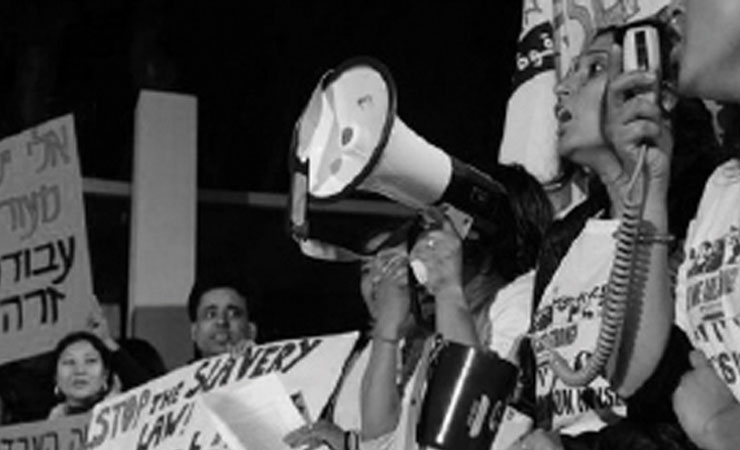By Noa Shauer, Coordinator of Agricultural Workers and Fallon Wexler, Kav LaOved Intern in the Agricultural Sector
In Israel, the majority of workers in the agricultural field are Thai; today, there are approximately 24,000 Thai workers here, 15-20% of which are women. After arrival to Israel, the workers are placed by recruitment agencies in remote farming locations. Usually a female worker will be the only woman in the location, living among a group of male workers. Imagine life in a completely isolated work environment, like a village in the Arava desert. Imagine agricultural workers working up to 15 hours a day, living together in a huge, undivided warehouse. At the end of the work day they are exhausted, and want to eat, shower, and perhaps have a quick Skype chat with their families back in Thailand. Everybody charges towards the only two available cold showers, grabs a bite to eat, and retires to bed.
Now try to locate a female worker in this picture. She is the only female among these 40 men. She also wants to have a shower, and she is also tired and hungry, and misses her family in Thailand. But she will probably wait until all the men have finished showering before she takes her turn, fearing sexual harassment, abuse, or worse. She will then retire to her room, if she has one. After a quick chat with family, she’ll fall asleep, only to wake when the knocks start on her door. All night long they knock on her door, hoping and demanding she will let them in.
Imagine another worker on another farm. She starts her day just like anybody else but at noon the Israeli employer beckons. His back hurts and he’s heard about the massages Thai women are famous for. So, if she doesn’t mind, he’ll be happy to receive one. The worker, confused by the situation and almost completely dependant on him for her work visa, does as he bids. The next day his son wants a Thai cultural experience as well. A week later, his wife orders her to clean their house twice a week. One of these times, the employer spanks her bottom and she objects. “It was just for laughs,” he says, “don’t take it the wrong way.” Unfortunately, the way the story goes doesn’t leave much to the imagination.
Though we know Thai women are coming to Israel under agriculture visas, it is unclear if they are really doing agricultural work here, or if the visas are being used for other jobs (i.e. domestic work, massages, sex work). By some definitions, the co-habitation of a woman in a hostile, male-only environment could qualify as trafficking or even sex trafficking of these women. In light of a growing phenomenon of sexual exploitation, unlawful employment in the field of agriculture and single females placed among male workers, we have to act swiftly and seriously to uncover this pattern of violations.
Therefore we have started a new project which aims to locate these women, assist them and inform them of their rights as women, not only as workers. Our project activities include working with and for the women and with the immigration authorities and the Ministry of Industry, Trade and Labor. We hope that promoting, informing and raising awareness to the issue – both among the women workers themselves and towards the Israeli authorities and public – will bring an end to the phenomenon and hold the offending employers accountable.
In the coming months, research will be conducted via interviews with Thai women workers, field visits, partnership with other organizations, academic research, and more. Kav LaOved has enlisted an intern from the Migration Studies master’s program at Tel Aviv University to investigate past cases of bringing women to Israel under work visas in order to provide sexual services to male workers from their home country. In such cases, there is concern that women are unknowingly being sex trafficked into Israel, or are held in conditions, against their will, which compromise their safety and wellbeing.


